NYSACTE, Advance CTE, and ECMC Foundation are excited to introduce the Fellows of the inaugural cohort of emerging leaders from across New York State. The Fellows of the NYSACTE Postsecondary State Career Technical Education (CTE) Leaders Fellowship at Advance CTE—Sponsored by ECMC Foundation include representation across multiple demographic categories reflecting the Fellowship’s goal of intentionally building a postsecondary leadership pipeline for underserved populations in CTE that closes racial representation gaps and removes equity barriers to postsecondary leadership advancement. This blog series will briefly introduce each NYSACTE Fellow.
 Dana Acee has been a higher education professional for 12 years and is passionate about serving students and her community. She began her career in enrollment management and has been in her current role as director of career & transfer services at Onondaga Community College (OCC) since August 2021. During her time at OCC, Dana has developed opportunities to increase student participation in work-based learning and led the integration of dedicated career and transfer support in each of OCC’s four Schools. Dana was a member of the 2023-2024 inaugural cohort of the New York State Community College Leadership Academy. She currently serves as a member of OCC’s Diversity, Equity, Inclusion, and Belonging Council, the Onondaga County One Stop Operator Group, and the OnPoint for College Career Services Advisory Board. Dana plays flute in the Central New York Flute Choir and is a certified yoga teacher, teaching at OCC and volunteering in the community.
Dana Acee has been a higher education professional for 12 years and is passionate about serving students and her community. She began her career in enrollment management and has been in her current role as director of career & transfer services at Onondaga Community College (OCC) since August 2021. During her time at OCC, Dana has developed opportunities to increase student participation in work-based learning and led the integration of dedicated career and transfer support in each of OCC’s four Schools. Dana was a member of the 2023-2024 inaugural cohort of the New York State Community College Leadership Academy. She currently serves as a member of OCC’s Diversity, Equity, Inclusion, and Belonging Council, the Onondaga County One Stop Operator Group, and the OnPoint for College Career Services Advisory Board. Dana plays flute in the Central New York Flute Choir and is a certified yoga teacher, teaching at OCC and volunteering in the community.
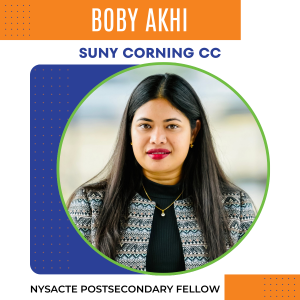 Boby Akhi, a full-time faculty member in the Business Administration and Accounting department at SUNY Corning Community College, also serves as chair of the Diversity Council. She is pursuing a Doctorate in Higher Education Leadership at Maryville University and holds three master’s and two bachelor’s degrees, earning a Presidential Gold Medal for academic excellence in her first graduate program. With five years of teaching experience in the USA and Bangladesh, Boby also brings three years of corporate experience from companies like John Deere. Her academic interests include leadership, diversity and inclusion, international business law, and entrepreneurship. Originally from Bangladesh, she now resides in Horseheads, NY. Fluent in four languages, she is an active member of Junior Chamber International (JCI).
Boby Akhi, a full-time faculty member in the Business Administration and Accounting department at SUNY Corning Community College, also serves as chair of the Diversity Council. She is pursuing a Doctorate in Higher Education Leadership at Maryville University and holds three master’s and two bachelor’s degrees, earning a Presidential Gold Medal for academic excellence in her first graduate program. With five years of teaching experience in the USA and Bangladesh, Boby also brings three years of corporate experience from companies like John Deere. Her academic interests include leadership, diversity and inclusion, international business law, and entrepreneurship. Originally from Bangladesh, she now resides in Horseheads, NY. Fluent in four languages, she is an active member of Junior Chamber International (JCI).
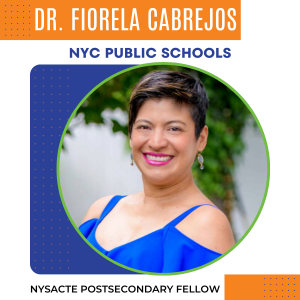 Dr. Fiorella Cabrejos is an innovative school leader serving in the Bronx, NY, for over two decades, dedicated to transforming education and empowering students through life-changing leadership. Born in Lima, Peru, and raised in White Plains, NY, she serves as a master principal for NYC Public Schools. Her groundbreaking Focused Coaching for Transformational Change (FCTC) model stems from her success in turning around Fordham Leadership Academy in the Bronx. Dr. Cabrejos has introduced pioneering programs like Smart Schools Early College, Future Ready, and Career Readiness Modern Youth Apprenticeship, focusing on college and career preparedness. She leads her school’s Equity Committee, addressing systemic oppression through curriculum reform for real-world and career connectedness alignment and restorative justice practices. With a doctorate from Fordham University, Dr. Cabrejos continues to coach principals and design master classes, aspiring to dismantle educational inequity and create excellent learning environments for all students, especially those from marginalized communities.
Dr. Fiorella Cabrejos is an innovative school leader serving in the Bronx, NY, for over two decades, dedicated to transforming education and empowering students through life-changing leadership. Born in Lima, Peru, and raised in White Plains, NY, she serves as a master principal for NYC Public Schools. Her groundbreaking Focused Coaching for Transformational Change (FCTC) model stems from her success in turning around Fordham Leadership Academy in the Bronx. Dr. Cabrejos has introduced pioneering programs like Smart Schools Early College, Future Ready, and Career Readiness Modern Youth Apprenticeship, focusing on college and career preparedness. She leads her school’s Equity Committee, addressing systemic oppression through curriculum reform for real-world and career connectedness alignment and restorative justice practices. With a doctorate from Fordham University, Dr. Cabrejos continues to coach principals and design master classes, aspiring to dismantle educational inequity and create excellent learning environments for all students, especially those from marginalized communities.
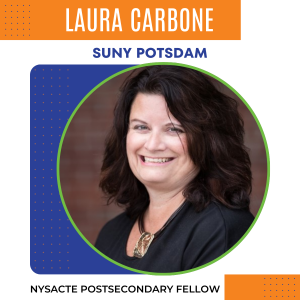 Laura Carbone is a passionate advocate and educator across the P-12 educational pathway. She graduated from St. Lawrence University with a CAS in Educational Leadership, SUNY Potsdam with an MSED in Inclusive Special Education, and a BA in Early Childhood/Childhood and History Education. Her areas of certification include, School District Leadership, Special Education N-12, B-6 Childhood, and History 7-12. She is currently the director of operations and management for the SUNY Potsdam Watertown Extension. Laura is also the coordinator for the Certificate of Advanced Studies Educational Leadership School Building /School District Leader & the Inclusive and Special Education Advanced Studies programs, and MSED Inclusive and Special Education program coordinator for SUNY Potsdam. She has been an adjunct instructor for SUNY Potsdam since 2009, teaching a variety of courses in both the special education and educational leadership program pathways. She was a former school district administrator for over 10 years in special education and academic interventions for the Indian River Central School District. Prior to that she was a teacher both in sixth grade, in an integrated co-teaching classroom, and high school global history.
Laura Carbone is a passionate advocate and educator across the P-12 educational pathway. She graduated from St. Lawrence University with a CAS in Educational Leadership, SUNY Potsdam with an MSED in Inclusive Special Education, and a BA in Early Childhood/Childhood and History Education. Her areas of certification include, School District Leadership, Special Education N-12, B-6 Childhood, and History 7-12. She is currently the director of operations and management for the SUNY Potsdam Watertown Extension. Laura is also the coordinator for the Certificate of Advanced Studies Educational Leadership School Building /School District Leader & the Inclusive and Special Education Advanced Studies programs, and MSED Inclusive and Special Education program coordinator for SUNY Potsdam. She has been an adjunct instructor for SUNY Potsdam since 2009, teaching a variety of courses in both the special education and educational leadership program pathways. She was a former school district administrator for over 10 years in special education and academic interventions for the Indian River Central School District. Prior to that she was a teacher both in sixth grade, in an integrated co-teaching classroom, and high school global history.
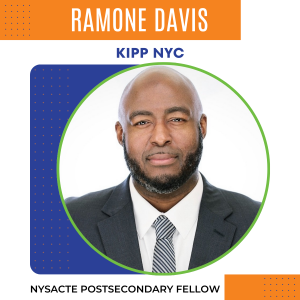 Ramone Davis is the associate director of CTE pathways & partnerships at KIPP NYC. For more than a decade he has provided critical post-secondary advisement, culturally responsive counseling, and instruction in the nonprofit sector. Demonstrating great creativity and flexibility working in several schools, liaising with partnership organizations, and providing support to meet the requirements of various funders. In his current role, he establishes programming and processes for Career & Technical Education (CTE) bound high school students and alumni. During his tenure managing the Workforce Team at KIPP NYC, the scope of his team’s postsecondary work expanded from solely serving NYC alumni to supporting recent graduates interested in CTE pathways from other KIPP regions and charter networks in Connecticut, New Jersey, Philadelphia, and Rhode Island.
Ramone Davis is the associate director of CTE pathways & partnerships at KIPP NYC. For more than a decade he has provided critical post-secondary advisement, culturally responsive counseling, and instruction in the nonprofit sector. Demonstrating great creativity and flexibility working in several schools, liaising with partnership organizations, and providing support to meet the requirements of various funders. In his current role, he establishes programming and processes for Career & Technical Education (CTE) bound high school students and alumni. During his tenure managing the Workforce Team at KIPP NYC, the scope of his team’s postsecondary work expanded from solely serving NYC alumni to supporting recent graduates interested in CTE pathways from other KIPP regions and charter networks in Connecticut, New Jersey, Philadelphia, and Rhode Island.
To learn more about the NYSACTE Fellowship please visit https://www.acteonline.org/nysacte/nysacte-postsecondary-fellowship/.


 This week both the House and the Senate remained in session. In the House, Republican leadership attempted to advance several federal fiscal year 2025 (FY25) appropriations measures through the full chamber. While lawmakers narrowly passed five of the annual dozen appropriations measures by late Thursday this week, these efforts have largely stalled due to inadequate support within the House Republican conference for the remaining funding bills. The Labor-HHS-ED appropriations bill—the funding measure that provides funding for the Carl D. Perkins Career and Technical Education (CTE) Act (Perkins V)—is among the measures with an uncertain future and although House leadership has indicated they will revisit this issue following the Congress’ upcoming August recess period.
This week both the House and the Senate remained in session. In the House, Republican leadership attempted to advance several federal fiscal year 2025 (FY25) appropriations measures through the full chamber. While lawmakers narrowly passed five of the annual dozen appropriations measures by late Thursday this week, these efforts have largely stalled due to inadequate support within the House Republican conference for the remaining funding bills. The Labor-HHS-ED appropriations bill—the funding measure that provides funding for the Carl D. Perkins Career and Technical Education (CTE) Act (Perkins V)—is among the measures with an uncertain future and although House leadership has indicated they will revisit this issue following the Congress’ upcoming August recess period. resources for community colleges to develop and provide robust training opportunities for learners. Applications for this funding are due September 24, 2024. Advance CTE is strongly supportive of the SCCTG program and is currently advocating for its codification in WIOA as discussions continue regarding reauthorization of this legislation.
resources for community colleges to develop and provide robust training opportunities for learners. Applications for this funding are due September 24, 2024. Advance CTE is strongly supportive of the SCCTG program and is currently advocating for its codification in WIOA as discussions continue regarding reauthorization of this legislation. 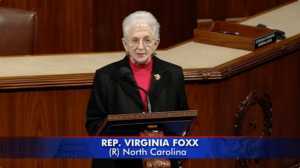
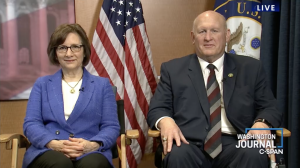
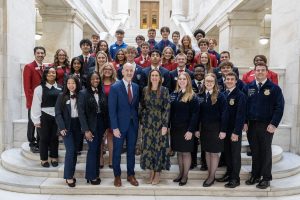
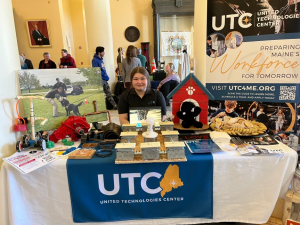 Maine kicked off Career and Technical Education (CTE) Month at the State House with a showcase featuring learners, instructors, and directors from 15 of the state’s 27 CTE centers. The showcase featured learners’ advanced skills in areas from biotechnology and hospitality to welding and graphic design. Notably, every instructor and director at the event reported an increase in “non-traditional students” participating in CTE programs.
Maine kicked off Career and Technical Education (CTE) Month at the State House with a showcase featuring learners, instructors, and directors from 15 of the state’s 27 CTE centers. The showcase featured learners’ advanced skills in areas from biotechnology and hospitality to welding and graphic design. Notably, every instructor and director at the event reported an increase in “non-traditional students” participating in CTE programs. 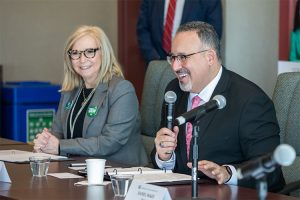 On February 21, U.S. Secretary of Education Miguel Cardona visited the Community College of Rhode Island (CCRI) as part of President Biden’s Investing in America Tour. The visit featured a tour of CCRI’s advanced manufacturing lab, a roundtable discussion with educational leaders, and dialogues with learners. Additional discussions took place with CCRI’s President Rosemary Costigan, Rhode Island Governor Dan McKee, and U.S. Representative Gabe Amo.
On February 21, U.S. Secretary of Education Miguel Cardona visited the Community College of Rhode Island (CCRI) as part of President Biden’s Investing in America Tour. The visit featured a tour of CCRI’s advanced manufacturing lab, a roundtable discussion with educational leaders, and dialogues with learners. Additional discussions took place with CCRI’s President Rosemary Costigan, Rhode Island Governor Dan McKee, and U.S. Representative Gabe Amo. 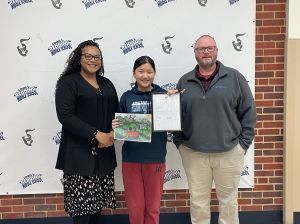 DACCTE Celebrates Poster Contest Winner
DACCTE Celebrates Poster Contest Winner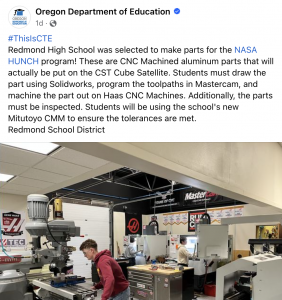
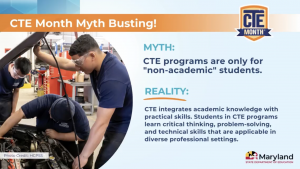
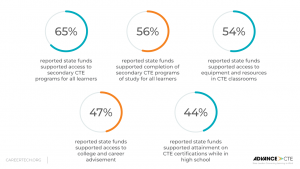

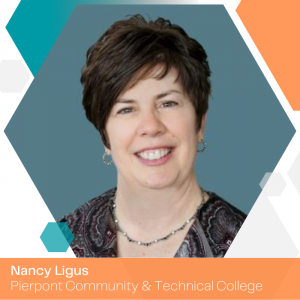 Tell me more about your journey to the Fellowship.
Tell me more about your journey to the Fellowship.
 “When our passion fuels our purpose, we will always blossom where we have been planted and do great work as servant leaders.”
“When our passion fuels our purpose, we will always blossom where we have been planted and do great work as servant leaders.”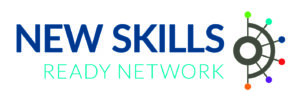 As part of ongoing blog topics providing updates on this initiative, Deshaun Mars, Vice President, Global Philanthropy (Job Skills,) and Brice Thomas, Policy Associate engaged in a discussion to highlight JPMC’s view of the initiative and how this work advances JPMC’s philanthropic portfolio and ultimately building high-quality local and state career pathway systems.
As part of ongoing blog topics providing updates on this initiative, Deshaun Mars, Vice President, Global Philanthropy (Job Skills,) and Brice Thomas, Policy Associate engaged in a discussion to highlight JPMC’s view of the initiative and how this work advances JPMC’s philanthropic portfolio and ultimately building high-quality local and state career pathway systems.  Nebraska
Nebraska